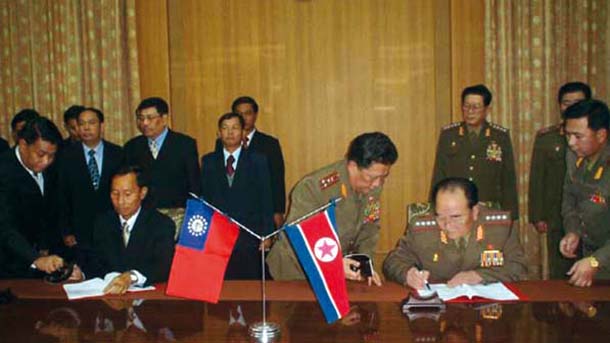A leaked UN report detailing allegations surrounding North Korean weapon smuggling cites Burma’s Lower House Speaker Shwe Mann and an agreement he reached with Pyongyang when he served as the third-ranking member of Burma’s previous military regime.
Details of the report prepared by a panel of UN experts tasked with enforcing global compliance of North Korea sanctions were revealed in a May 17 article published by Reuters, which claimed to have seen a copy.
While noting official statements from Burma’s government denying nuclear cooperation with North Korean, the report’s authors questioned whether “other prohibited cooperation” between the two countries took place, according to Reuters.
The report includes statements Shwe Mann made in semi-official Burmese media last year explaining an agreement he reached with North Korea during his 2008 visit to Pyongyang.
“During my visit to North Korea3 as a general, we signed a Memorandum of Understanding on cooperating between the two armed forces. It was not on nuclear cooperation as is being alleged,” Pyi Myanmar weekly quoted Shwe Mann as saying in December 2011.
“We studied their air defense system, weapons factories, aircrafts and ships. Their armed forces are quite strong so we just agreed to cooperate with them if necessary,” Shwe Mann added.
Shwe Mann’s admission that Burma had partnered with North Korea in military-related fields came shortly after Hilary Clinton’s visit to Burma. The Irrawaddy first reported on Shwe Mann’s secret November 2008 visit to North Korea in July 2009.
According to Reuters, the UN report indicated that Shwe Mann “may have visited a ballistic missile factory in North Korea” and suggested that the 2008 agreement he signed with North Korea during his trip could have violated UN sanctions that prohibit North Korea from buying and selling missile, weapons or nuclear technology.
The Reuters story also said that the UN report mentioned President Thein Sein’s denial that Burma does not “have nuclear or weapons cooperation with the DPRK. [Democratic People’s Republic of Korea].”
The UN report suggests, however, that this may not be entirely true. In an article published on May 19, The Associated Press cited unnamed security diplomats who said that the UN report also included details of how last year a North Korean ship suspected of attempting to transport missiles or other weapons to Burma turned around when it was challenged by a US naval destroyer.
According to the AP report, the incident took place in May 2011, just weeks after President Thein Sein’s nominally civilian government took power. AP revealed that the UN report also mentioned a similar June 2009 incident when a suspected Burma-bound North Korean weapons ship turned around and went back home “apparently after it became aware it was being tracked.”
According to anonymous diplomats cited by Reuters, the report, which was commissioned by the UN Security Council, may never be made publicly available because China, North Korea’s ally on the Security Council, will likely veto its release. The report also details alleged North Korean arms shipments to Syria.
The revelations about Shwe Mann being mentioned in the UN report came just days after the ex-general-turned-politician completed a European tour. The trip saw the Than Shwe protege (once described in a leaked US diplomatic cable as “Burma’s dictator-in-waiting) greeted by senior EU officials and the governments of Norway and Germany as a democratic reformer.
The UN report could prove to be an embarrassment to Shwe Mann, who is described by many observers as a serious contender to replace Thein Sein in the presidency. Leaked US diplomatic cables suggest he was an active participant in abuses while commanding offensives against the Karen National Union in 1989. A cable dated March 2007 reports: “Like most Burmese field commanders, Shwe Mann utilized forced civilian porters, including women and children, on a massive scale during operations against Karen insurgents.”
A leaked diplomatic cable from December 2007 suggests that although Shwe Mann “is thought to be more open-minded, by all accounts he willingly participated in the brutal repression of September’s pro-democracy protests.”
A June 2009 cable cites a Rangoon businessman who told US diplomats that Shwe Mann and Vice Snr-Gen Maung Aye were favoring Shwe Mann’s son Aung Thet Mann and other cronies “for new projects and licenses in return for their ‘assistance.’”
A cable dated July 2009 quotes another Rangoon businessman who said that Aye Ya Shwe Wa, a firm owned by Aung Thet Mann and another firm owned by Tay Za were Burma’s two biggest exporters of beans and pulses. The businessman also suggested that Aung Thet Mann used his father’s connection to secure permits to export rice for his firm.
Shwe Mann failed to mention his son’s business activities when he made a speech to Parliament in February addressing corruption in Burma.
Shwe Mann met with UN Secretary-General Ban Ki-moon on April 30 during the UN chief’s three day visit to Burma, but it is unclear if Shwe Mann’s dealings with North Korea were discussed at the time.

















